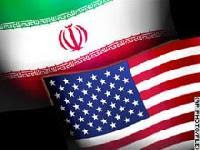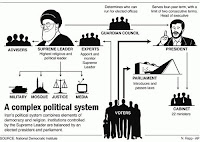Beneath Contempt

Until the 2003 invasion of Iraq, the middle East stability from Washington's viewpoint was based on the Iran-Iraq balance of power. The US invaded Iraq on the assumption that it could quickly defeat and dismantle its government and replace it with a pro-American regime. By tapping Iraq's Oil resources they hoped to refinance their military expenditure to a large extend, even manipulate the OPEC pricing policy amongst others. The claim of restoring the balance of power was perhaps an issue that could ease some of the more skeptical politicians in the US. When that assessment proved inaccurate, Washington was forced to assume a policing role as well as acting as a shield to prevent Iran from dominating the country and thereby gaining control of the Persian Gulf.
US and Iran both wanted to eliminate Saddam Hussein’s regime, they possibly even collaborated, although not proven. But from there, their goals diverged. The Iranians hoped to establish a system in Iraq that consisted of the 3-4 Million Iraqi Shia opposition members living in Iran (not few were militarily trained like the Hezbollah commando units),a system that could be considered Iran friendly. Washington on the other hand, sought to establish a regime that would thwart the Iranians. This effort however, was long anticipated and Iran's preparedness on this issue was the “Guard-e- Javidan” tactic. The Guard-e-Javidan was a 10,000 man strong elite unit in the Achaemenid dynasty and the logic was that when the first row fell the second row would take over. That was exactly what Iran had prepared for Iraq, as the Ayatollah Hakims and other known Alpha elements of the Iraqi Shia opposition fell through assassinations upon returning to Iraq by the CIA, they were almost simultaneously replaced with others the US had never heard of before and waves of names and groups emerged that left a de-baathified Iraqi society with an American occupation force in search for calm at any price.
Analysts tend to believe now that Iraq, and not nuclear weapons, is the key bone of contention between Iran and the USA. Iran is eager to see the US withdraw from Iraq so that a formidable obstacle to it establishing calm and stability on its western border is removed. Iran’s relations with Iraq would become even deeper as that of Iran’s with Syria and thus Israel would suddenly not be so unreachable anymore should it dance out of line again, since the whole dynamics of the known Middle East problems, starts and ends with Israel and its unaccountability due to the USA’s unadulterated support and political cover. Iran's military dominance in the Persian Gulf is indisputable amongst the Military forces on site, but regularly trivialized for the benefit of the western press. Washington, on the other hand, wants to withdraw from Iraq because it faces growing challenges in Afghanistan , but keeps postponing due to its fear that Iraq could turn to Iran after they are gone. The US hopes of a satellite, pro-US government regime in Baghdad that would eventually resist Iran's regional ambitions.
Conclusion is, Iran has learned how to deal with power policies, Iraq shall eventually and inevitably turn to Iran and the reason is simple, the other side of the equilibrium is the ever corrupt and despotic Saudi Arabia who wants the Shia suppressed and a minority regime a la Saddam Hussein to take over….again. Half these terror attacks we constantly hear of in Pakistan and Iraq and from time to time in Iran, are committed by drugged assassins of Wahabi followers, and this has been the US problem all along. As long as the USA keeps chasing the wrong enemy, and keeps covering up for the Saudis, like they cover the wrong doings of Israel, then this war shall continue.,and no Afghanistan conference and other treaties can guarantee and imply the end of it by setting dates for withdrawals and handovers.



Comments
Thank You Sir